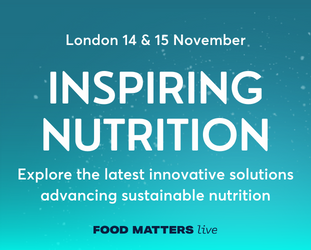5 functional food and ingredient trends and innovations for 2023

Functional food products and ingredients have had a big year, and this looks set to continue into 2023. Consumers want more from their food than simple calorie injections now – and this has only been amplified by factors like the global pandemic, evolving science and broader food availability.
Foods and ingredients which can offer more than just energy or a pleasant taste – be that a more balanced gut microbiome, a better night’s sleep, a boosted immune system or any other functional gains – will be the real stars in 2023 and beyond.
With consumers more interested in this highly innovative section of the industry than ever before, here are the trends to look out for in the year ahead:
Products which straddle the supplement/food divide
A large portion of people interested in functional foods will already take at least one kind of supplement to aid their health and wellbeing. However as Laura Swain, Food, Beverage & Hospitality Editor at consumer insights company Stylus, explained in a recent Food Matters Live Trends Panel, functional food manufacturers should be wary of contributing to “pill fatigue”. Additionally, she pointed out younger generations in particular want their functional foods to “feel like a treat rather than a chore”.
As a result, Laura predicts that companies which can hone innovative and engaging ways to consume functional ingredients will become popular among consumers. She gives the example of US-based start-up Sourse, which has transformed the traditional daily multivitamin using chocolate. Instead of a pill capsule or chewable dose, consumers can consume their vitamins while enjoying fortified chocolate treats instead.
Collagen that is better for the environment
Collagen has been a perennially popular functional ingredient for several years now, with experts touting it for its skin, bone and general wellbeing benefits. However as Holland & Barrett Senior Nutritionist Alex Glover points out that many collagen-based functional foods on the market right now utilise bovine collagen, which isn’t a sustainable source of the ingredient.
He predicts that plant-based and fermented types of collagen are set to grow in popularity in 2023 as consumers seek out solutions which have a lower environmental impact. Several start-ups are already working within this space, including Jellatech and Aleph Farms.
Functional foods that value personal and planetary health equally
Following on from more environmentally friendly collagen, functional foods which leverage sustainability principles are also set to be popular. There are many forms that this may take, Laura explains, including foods made with fruit skins, pits and waste and those made with algae, which has a host of functional benefits and a very low environmental footprint.
She also predicts that 2023 will be the year we begin seeing companies leveraging soil health as a means to delivering more effective functional food. Plant and human microbiomes are akin in composition and share similar bacteria types. Microbes, vitamins and minerals from soil can be absorbed by fruits and vegetables and have positive impacts on the human gut microbiome.
Mushrooms, everywhere
Mushrooms are set for a big year in 2023, according to Alex. “From a solely nutritional viewpoint, mushrooms don’t offer us much,” he explained in the Trends Panel, but as functional ingredients there is huge potential across the many species of edible mushrooms.
Lion’s mane mushrooms, for example, have been shown to have neuroprotective effects (helping to safeguard the health of brain cells) as well as having an abundance of the heart-friendly fibre beta-glucan; meanwhile more common varieties like button and shiitake mushrooms can be utilised for their anti-inflammatory properties.
Mushrooms are already making their way into plenty of functional food formulations, but expect to see them front and centre in 2023 – especially with products like Rheal’s mushroom Hot Chocolate powder and Dirtea’s Reishi Mushroom Tea.
Functional drinks appearing in bars
Low and no alcohol drinks have been enjoying a surge in popularity in recent years as large numbers of consumers reassess their relationship with alcohol. Alongside boasting a hangover-free drinking experience, many of these drinks come with added functional benefits – from vitamin D, to fermented ingredients for good gut health, and CBD to boost mood.
Many experts like Laura predict that 2023 will be the year these drinks finally make their way into bars, as hospitality providers look to cater to a widening market of non-drinkers. Expect to soon see non-alcoholic cocktails and signature drinks which offer a range of functional benefits on a drinks menu near you.










